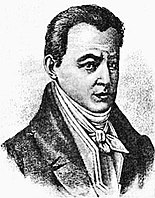Ivan Petrovych Kotlyarevsky (Ukrainian: Іван Петрович Котляревський) (9 September [O.S. 29 August] 1769, Poltava – 10 November [O.S. 29 October] 1838, Poltava, Russian Empire, now Ukraine), was a Ukrainian writer, poet and playwright,social activist, regarded as the pioneer of modern Ukrainian literature. Kotlyarevsky was a veteran of the Russo-Turkish War.
Biography[]

Ukrainian gold coin dedicated to the 200th anniversary of the Kotlyarevsky's "Eneyida", 1998.
Eneyida by Kotlyarevsky
Aeneas was a lively fellow
And quite a Cossack for a lad,
For mischief he was more than mellow
While courage above all he had.
But when the Greeks felt very bitter
And made of Troy a heap of litter
He took a bag, and with a lust -
With some good Troyans whom he gathered
Whose hides were tough and necks well lethered -
He showed old Troy a cloud of dust.
He quickly built some boats of timber,
Then launched them in the quiet sea
And filling them with muscle limber
He hit the foam where eyes could see.
But cackling Juno, dog-gone-daughter,
Kept cackling like a for water;
- That's how Aeneas lacked her grace -
A long long time she had been praying:
She wished his soul would stop delaying
The trip to that unearthly place.

Ivan Kotlyarevsky

The first edition of Kotlyarevsky’s Eneyida, 1798.

Monument to Kotlyarevsky in Poltava (1903, sculptor P. Pivnyy)
Kotlyarevsky was born in the Ukrainian city of Poltava in the family of a clerk. After studying at the Poltava Theological Seminary (1780–1789), he worked as a tutor for the gentry at rural estates, where he became familiar with Ukrainian folk life and the peasant vernacular. He served in the Imperial Russian Army between 1796 and 1808 in the Siversky Karabiner Regiment. Kotlyarevsky participated in the Russo-Turkish War (1806–1812) as a staff-captain (something of 1LT or junior CPT) during which the Russian troops laid the siege to the city of Izmail. In 1808 he retired from the Army. In 1810 he became the trustee of an institution for the education of children of impoverished nobles. In 1812, during the French invasion of Imperial Russia he organized the 5th Ukrainian Cossack Regiment in the town of Horoshyn (Khorol uyezd, Poltava Governorate) under the condition that it will be left after the war as a permanent military formation. For that he received a rank of major.[2]
He helped stage theatrical productions at the Poltava governor-general's residence and was the artistic director of the Poltava Free Theater between 1812 and 1821. In 1818 together with Vasyl Lukashevych, V.Taranovsky, and others he was the member of the Poltava Freemasonry Lodge The Love for Truth (Ukrainian: Любов до істини).[3][4] Kotlyarevsky participated in the buyout of Mikhail Shchepkin out of the serfdom. From 1827 to 1835 he directed several philanthropic agencies.[2]
The first modern Ukrainian writer[]
Ivan Kotlyarevsky's mock-heroic 1798 poem Eneyida (Ukrainian: Енеїда), is considered to be the first literary work published wholly in the modern Ukrainian language. Although Ukrainian was an everyday language to millions of people in Ukraine, it was officially discouraged from literary use in the area controlled by Imperial Russia. Eneyida is a parody of Virgil's Aeneid, where Kotlyarevsky transformed the Trojan heroes into Zaporozhian Cossacks. Critics believe that it was written in the light of the destruction of Zaporizhian Host by the order of Catherine the Great.
His two plays, also living classics, Natalka Poltavka (Natalka from Poltava) and Moskal-Charivnyk (The Muscovite-Sorcerer), became the impetus for the creation of the Natalka Poltavka opera and the development of Ukrainian national theater.
| “ | the love to Fatherland that is glorified no enemy force will withstand, a chest will become stronger than guns. (любов к Отчизні де героїть, там сила вража не устоїть, там грудь сильніша від гармат) |
” |
—Ivan Kotlyarevsky[5] | ||
References[]
- ↑ "1933" The Ukrainian Weekly 1933-03.pdf (English)
- ↑ 2.0 2.1 Ivan Kotliarevsky. Eneida: Excerpts. Translated by Andrusyshen C. H & Kirkconnell W. in the anthology The Ukrainian Poets 1189–1962. Published for the Ukrainian Canadian Committee by the University of Toronto Press in Toronto, 1963.
- ↑ Sliusarenko, A. H., Tomenko, M. V. Istoriia Ukrainskoi Konstytytsii, "Znannia", (Ukraine 1993), ISBN 5-7770-0600-0, pg. 38 (Ukrainian)
- ↑ List of freemasonry lodges in Ukraine (Ukrainian)
- ↑ Чому «вороженьки» бояться пам’яті героїв Крут?
External links[]
| Wikimedia Commons has media related to Ivan Kotlyarevsky. |
| Wikisource has original text related to this article: |
- Ivan Kotlyarevsky in Encyclopædia Britannica
- Ivan Kotliarevsky in Encyclopedia of Ukraine
- Works by Ivan Kotliarevsky for reading online in Ukrainian
- Eneyida - a living classic of Ukrainian literature in Welcome to Ukraine, 1999, 1
- Excerpts from Eneyida (translated into English)
- Text of Eneyida (Ukrainian)
The original article can be found at Ivan Kotliarevsky and the edit history here.
